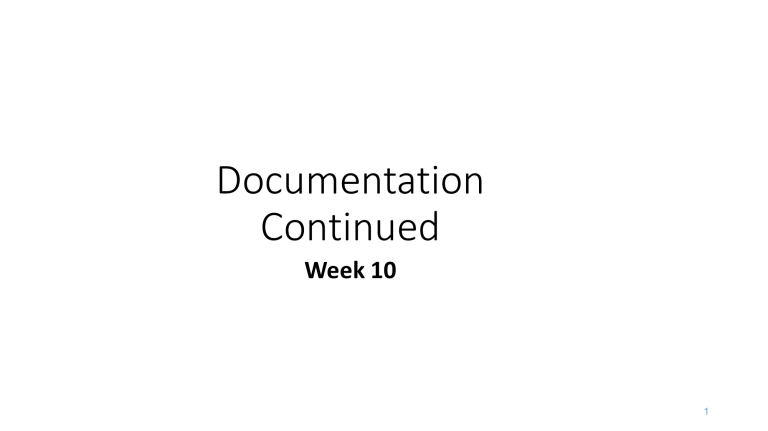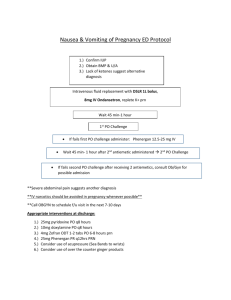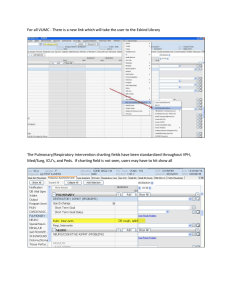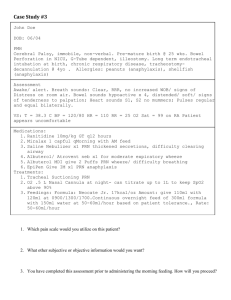
Documentation Continued Week 10 1 Let’s Review ADPIE….. SOAPIE……. & FAIR……… 2 Charting by Exception • shorthand method of charting that uses well defined standards of care • only significant findings or “exceptions” are documented • less charting time needed • more emphasis on significant findings • standardized assessments • better tracking of important pt responses 3 main disadvantage is difficulty proving high quality care easy to become complacent and not really pay attention to what you’re documenting tick charting questionable from a legal standpoint popular due to time constraints but may not be the best from a legal point of view 4 5 6 Tools for Nursing Documentation • Initial nursing assessment • TOAs (Transfer of Accountability) -- Electronic • Nursing plan of care • Care maps/pathways • Progress notes • Flow sheets – graphic record, fluid balance record, medication record, 24 hour care records 7 • Discharge and transfer summary • Home care documentation • Long term care documentation • MAR’s • Incident reports 8 9 Run Date Run Time Run User: LG UOIT DC-UOIT HOSPITAL Transfer of Accountability Page 1 SAFETY ASSESSMENTS TREATMENTS/THERAPIES ADL’S PROCEDURE/CONSULT Harpreet Singh Room 45 Patient Profile* on admission Respiratory Care *PRN Procedure/Test/Treatment*PRN Plan: home with son Plan: physio on discharge GI: Bowel Elimination *PRN ADL Summary: Attend/Assist Q4h Hygiene: DEPENDENT Age: 72 LOS 5 Vital Signs: Q4H GU: Urine Elimination *PRN Activity/Stage: CHAIR BID Dr. Michael Weigh: weekly Wound Care Site: *PRN Site: yesterday Changed: Elimination: COMMODE Pain *PRN Physical Assessment *once shift Braden Skin Risk Assessment: *Q48 H Score: 11 Last BM: 5 days ago 16/11 right & left knee-osteoarthritits in bilateral patellar regions 16/11 CXR: consolidation LLL; compatible with Left lower lobe pneumonia Specimen Collection: Labs on admission Diet: regular Periph Site#1: Locked off*PRN Site: LT Arm Change due: siteTubing Intake: Measure Volume *PRN Communication with MD/Allied Health PRN Assist required: ASSIST X1 uses walker Droplet precautions Isolation Mobilize/Reposition *PRN Psychosocial/Edu: Pt/family *PRN **Emotional check daily @1400 Output: Measured Volume*PRN 10 Allergy and Adverse Reactions No pork Reason for visit to hospital pneumonia LLL Medical History: mild COPD Nurse’s Clinical Impression 19/11 Pt started with productive cough 4 days ago, sputum becoming more green **patient speaks Hindu with little English, notify switchboard for a HINDU interpretator 11 12 Critical pathways/care maps • integrates expected care plan with documentation tool • flow sheets designed to match each days expected outcomes • may be used in collaboration with charting by exception • great time saver but doesn’t take into account pt variations 13 Practice charting…..SOAPIE and FAIR • Mrs. Benson, 85 years of age, has a history of CHF. Her V/S at 0830 are 37.6 - 54 – 24 – 180/90. She states that she is having difficulty breathing, even with minimal exertion. She is anxious and restless, and is feeling very tired. 14 Electronic Documentation Computer programs of documentation Eg. Meditech/LEADS Computer based patient care record Used in LH corporation and Markham Stouffville Hospital in our local area LEADS (LHO, 2011) • Lakeridge Electronically Accessed Documentation System • “LEADS is an electronic clinical documentation system that enables physicians, nurses and the interprofessional team to access the electronic health record (EHR) of Lakeridge Health patients concurrently. “ (p. 1) • “LEADS has the added functionality of a workload measurement collection tool for nursing and the interprofessional team.” (p. 1) • “LEADS documentation methodology incorporates a standards based approach using best practice guidelines for documentation, assessment parameters and protocols, and integrates elements of Charting by Exception (CBE©) and Focus© charting systems.” (p. 1) Vital Signs Vital Signs Multiple B/P Reporting 20 Telephone reports....when you have to call the physician • identify yourself and which pt you’re calling about • keep report short and sweet but don’t miss important information • have the chart handy so you can give current vitals, lab results etc. • record date and time of call, what you said, physicians name, any order given 21 Use SBAR to keep on track!! • Situation –get their attention! • Background – pertinent info that supports why you’re calling • Assessment – what do you think is going on? • Recommendations – what do you want the physician to do? 22 Reports/ handoffs • Reports are oral, written, or audiotaped exchanges of information between caregivers. 5W’s of Reporting • Who • What • Where • When • Why • …….and how!!!!! Who gives report? What is reported? Critical information Pertinent information Assessment information Care provided Identified needs, concerns and goals Where is report given? • In a confidential and private environment!!! • It is essential that you are careful not to breach the standards of confidentiality when giving report! When is report given? Change of shift Telephone reports Transfer reports Incident reports SBAR Why is report given To provide continuity of care and to effectively meet the patient’s needs! How is report given? • Can be given: verbally, written, audio taped, summary report or walking rounds • Should be given: in a systematic, concise and factual manner • -professionally • -nonjudgemental • -should allow for the nurse to ask relevant questions Example of a Report Mr. Yeung, 85 yrs old, Right CVA, history of COPD, Benign Prostate hyperplasia 37, 62, 14, 146/92 Had large BM, soft Reddened area on coccyx 5 mm round Turned and positioned q2h, presently in Right lateral Changed dressing on Lt elbow – no drainage, healing well Right now he is in bed and his wife is visiting. She states she will stay and assist him with his dinner. What does this remind you of? Think of the documentation formats you have learned….. What would be an easy way to remember this? Do not give this report!!! I was assigned to room 304 like you know the client with the stroke. I gave him a shower today, he like complained the water was too cold so I had to turn it warmer. Then he had a huge BM during the shower, and I had to like clean him up. That took a lot of time. I took his vitals, his BP was a little high He needed to be turned ‘cause’ I noticed he is getting a sore on his butt but don’t worry, me and Amanda turned him and made sure he will stay on his side. Oh, yah, his wife like came in. I think she is still here. See yah next week. What is wrong with this report???? Incident reports……. also called variance or occurrence report filled out when anything out of the ordinary occurs that has real or potential ability to cause harm used for quality assurance tracking should not be used for discipline Copy not always placed on chart with minimal documentation in progress record 33 Reports to family members….. find out from patient who is entitled to a progress report (confidentiality) if pt can’t communicate this information then you have to use your best judgment if large family, ask for one spokesperson you cannot give out information to lawyers, police, insurance companies, employers, friends etc. without pts permission 34 Common Charting Mistakes to Avoid • Failing to record pertinent health or drug information • Failing to record nursing actions • Failing to record that medications have been given • Recording on the wrong chart 35 • Failing to document a discontinued medication • Failing to record drug reactions or changes in the patient’s condition • Transcribing orders improperly or transcribing improper orders • Writing illegible or incomplete records 36 Electronic Documentation Exercise 37 Next Week • Practicum Preparation • Being Safe in Practicum • Patient Safety • Patient Health Teaching • Learning Plan Assignment Due


